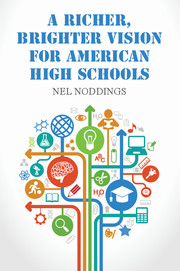Book contents
- Frontmatter
- Contents
- Introduction
- 1 Unity of Purpose
- 2 Vocational Programs
- 3 What Might Have Been: Women's Traditional Interests
- 4 A Better Adult: Continuing the Search
- 5 Parenting
- 6 The Common Core Standards
- 7 Critical Thinking
- 8 Collegiality, Caring, and Continuity
- 9 The Curriculum and Its Setting
- 10 Planning, Enacting, Evaluating
- 11 The Professional Preparation of Teachers
- 12 Reflecting on the Brighter Vision
- Notes
- Bibliography
- Index
7 - Critical Thinking
Published online by Cambridge University Press: 05 June 2015
- Frontmatter
- Contents
- Introduction
- 1 Unity of Purpose
- 2 Vocational Programs
- 3 What Might Have Been: Women's Traditional Interests
- 4 A Better Adult: Continuing the Search
- 5 Parenting
- 6 The Common Core Standards
- 7 Critical Thinking
- 8 Collegiality, Caring, and Continuity
- 9 The Curriculum and Its Setting
- 10 Planning, Enacting, Evaluating
- 11 The Professional Preparation of Teachers
- 12 Reflecting on the Brighter Vision
- Notes
- Bibliography
- Index
Summary
The Common Core Standards are permeated by a concern for critical thinking: critical reading, the analysis of documents, editing for meaning, defining problems, solving problems, searching for order, and conceptual understanding. This emphasis is to be applauded, but questions arise not only about how to teach critical thinking but, more basically, about how to define its scope and application over a wide range of human activity. Must everyone learn to apply critical thinking to the foundations of mathematical operations? Must everyone become capable of using critical thinking in reading historical or scientific documents? And how is critical thinking related, if it is, to the moral dimension of life?
SOME BACKGROUND
Although philosophers and educators have long agreed on the importance of critical thinking, they have engaged in lively debates about how to define and teach it. Some forty years ago the debate centered on whether critical thinking is field dependent or a subject/skill that can be taught on its own. Those who argued for its field dependence pointed out – rightly, I think – that one can hardly think critically in an area about which one has no knowledge. One can hardly criticize a taxonomy of flowering plants, for example, if one knows nothing about plants. Similarly, it would be difficult to argue the merits of a political proposal if one knows little about the purpose of the proposal and the context in which it is proposed.
However, strong counterarguments have been made for the centrality of logic in all forms of critical thinking, and symbolic logic can be taught without reference to a specific subject or field outside it. Certainly, all students should become familiar with the basic form of a syllogism: If all birds can fly and robins are birds, we may conclude that robins can fly. As a math teacher, I learned that many students find logic in both words and symbols fascinating and useful.
- Type
- Chapter
- Information
- A Richer, Brighter Vision for American High Schools , pp. 101 - 114Publisher: Cambridge University PressPrint publication year: 2015



